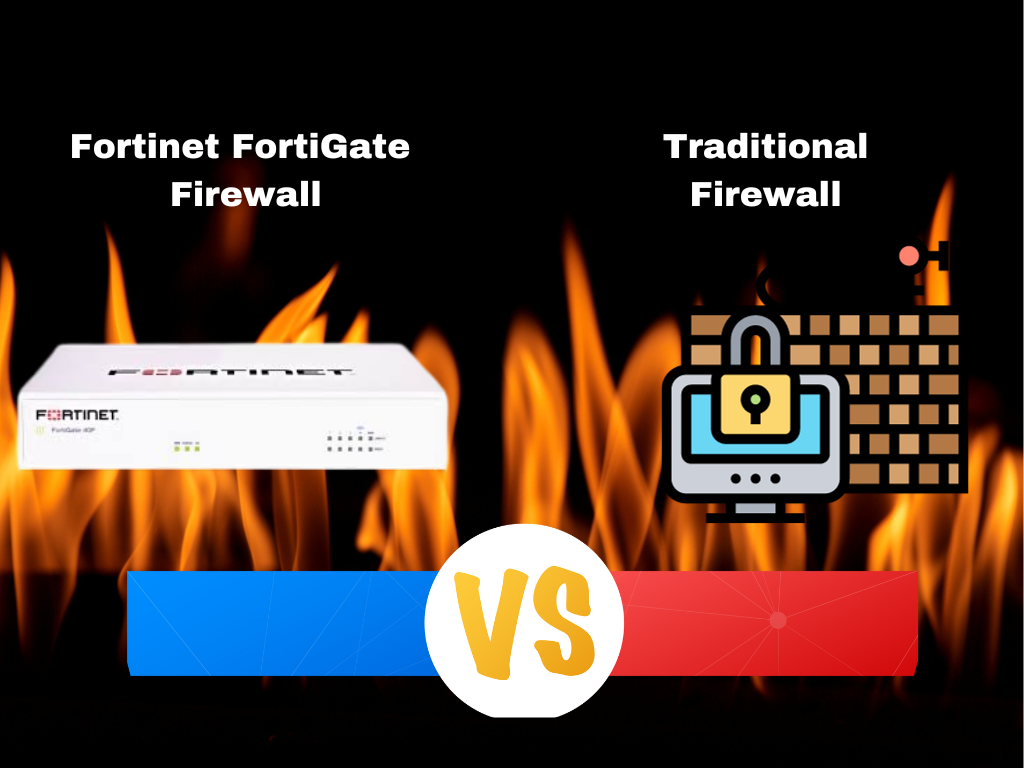In the ever-evolving landscape of cybersecurity, protecting your organization's network from threats is a top priority. Firewalls are a critical component of this defense, acting as a barrier between your network and potential attackers. While traditional firewalls have been the go-to solution for years, modern threats demand more robust and sophisticated security measures. One such solution is the Fortinet FortiGate Firewall. In this blog, we will explore the key differences and advantages of Fortinet FortiGate Firewalls compared to traditional firewalls, and why it might be time for an upgrade.
The Challenge of Traditional Firewalls
Traditional firewalls have been a staple in network security for decades. These firewalls use simple rule-based methods to filter incoming and outgoing traffic based on IP addresses, port numbers, and protocol types. While they have been effective in the past, they face numerous challenges in the face of today's complex and dynamic threat landscape:
-
Limited Security Inspection: Traditional firewalls are primarily designed to filter traffic based on basic criteria. They lack the advanced threat detection and content inspection capabilities required to safeguard against modern threats like advanced malware, zero-day vulnerabilities, and targeted attacks.
-
Scalability Issues: As networks grow and evolve, traditional firewalls can struggle to keep up. They may require constant manual updates to accommodate new services and applications, leading to administrative overhead.
-
Lack of Application Visibility: Traditional firewalls often lack the granular visibility into applications and their associated risks. This inability to distinguish between legitimate and malicious applications can leave networks vulnerable to attacks.
-
Inadequate User Identification: Modern networks demand user-based policies, but traditional firewalls often rely on IP addresses, making it challenging to enforce personalized access controls.
Fortinet FortiGate: The Modern Solution
Fortinet's FortiGate Firewall represents a significant evolution in the world of network security. Here's how it stands apart from traditional firewalls:
-
Advanced Threat Protection: FortiGate firewalls come equipped with a wide range of advanced security features, including intrusion prevention, anti-malware, application control, web filtering, and SSL inspection. This multifaceted approach provides protection against a variety of threats.
-
Single Pane of Glass: FortiGate offers a unified management interface, enabling you to control and monitor security policies and configurations across your entire network from a single console. This simplifies administration and reduces operational complexities.
-
Application Control: Unlike traditional firewalls, FortiGate excels in application visibility and control. It can categorize and control thousands of applications, allowing you to create granular policies that determine which applications are permitted or denied.
-
User Authentication: FortiGate can integrate with authentication systems, such as Active Directory and LDAP, for user-based policies. This means you can tailor access controls and policies based on individual users rather than IP addresses.
-
Scalability and Performance: FortiGate firewalls are built with scalability in mind, making them suitable for networks of all sizes. They are designed to deliver high-performance security without compromising network speed.
-
Zero Trust Network Access (ZTNA): FortiGate supports ZTNA, a security model that assumes zero trust and verifies every user and device attempting to connect to the network, even if they are on the inside.
Conclusion
In today's fast-paced digital world, network security is not a one-size-fits-all endeavor. Traditional firewalls, while useful in their own right, struggle to keep up with the constantly evolving threat landscape. Fortinet's FortiGate Firewall, on the other hand, provides a more comprehensive and adaptive approach to network security, offering advanced threat protection, application control, user authentication, scalability, and more. In the ultimate face-off between FortiGate and traditional firewalls, it's clear that the former is better equipped to meet the challenges of modern cybersecurity.
As the stakes in the cybersecurity game continue to rise, investing in a robust and dynamic solution like FortiGate is not just a smart choice; it's a necessity for safeguarding your organization's valuable assets and data. So, if you're looking to fortify your network defenses, it might be time to bid adieu to the traditional and embrace the future with FortiGate.
You May Consider:












